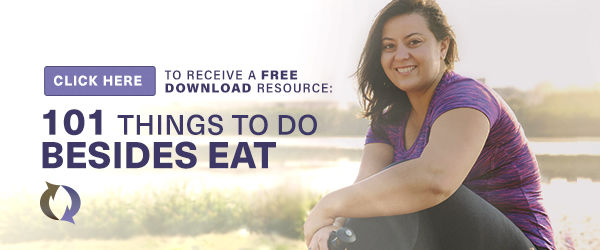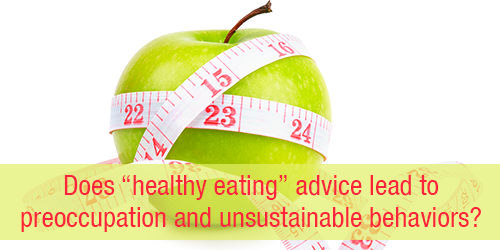Too often, “healthy eating” advice is just a diet in disguise! How can you tell the difference – and why does it matter?
“Healthy” eating?
- Eat smaller meals more frequently.
- Avoid “bad” carbs.
- Keep tempting foods out of the house.
- Include a fruit or vegetable with every meal.
- Log your daily food intake.
- Don’t eat more than X calories (or points).
- Exercise regularly to balance your intake.
Does advice like that really promote health? Or does it encourage an unhealthy preoccupation with food and unsustainable behaviors that eventually lead to failure, disappointment, and guilt?
The good news in the workplace wellness arena is that many experienced health promotion practitioners today recognize that diets don’t work and never will. The bad news is that sometimes the ineffective diet advice from the past is replaced with something that sounds better, but isn’t. Old-fashioned diet advice is recycled with “new” twists, but the underlying restrictive messages remain.
Removing the mask from diets in disguise
 The phrases “healthy eating” and “lifestyle change” are often just diets in disguise that encourage restrictive eating patterns and keep people stuck in harmful eat-repent-repeat cycles.
The phrases “healthy eating” and “lifestyle change” are often just diets in disguise that encourage restrictive eating patterns and keep people stuck in harmful eat-repent-repeat cycles.
How do you know if the advice you give or receive could actually be a diet in disguise?
- Listen for words like: control, temptation, calories, points, skinny, good and bad, always, never, correct portion sizes, measure, weigh, or count.
- Read between the lines of the advice and look for ideas and concepts like: fear, in control, out of control, all or nothing, guilt, deprivation, willpower, our bodies can’t be trusted.
- Ask yourself:
-
- Could I really stick with this advice long term, day in and day out, forever? Would I want to?
- Could other people stick with this advice long term, day in and day out, forever?
- Would this allow one to truly enjoy eating and live fully without becoming focused on food?
What’s the alternative?
While many health professionals recognize diets don’t work long term and a restrictive approach to eating can even be harmful, they may not realize that there’s an alternative. That’s where mindful eating comes in.
A growing body of evidence indicates that mindful eating is a great answer to “What’s the alternative?”
In corporate settings where employees are increasingly incentivized to participate in short-term ineffective weight management programs and biggest loser-style contests, mindful eating fills a much needed gap. It is a rational, inspiring solution that is so desperately needed in workplace wellness.
Perhaps a participant at HCSC explained it best: “Diets have been failing me for decades, but this is effective beyond anything else I have ever attempted. Restriction and rules make me want to rebel which sets me up for failure. I feel certain other people have this same type of challenge and would benefit from this program.”
In this Syracuse University article, Am I Hungry? Mindful Eating Program Helps Staff Member Ditch Emotional Eating and Dieting Mentality: “The program is about mindfulness,” Kristi Vega says. “It’s about examining your relationship with food and relearning your own body’s signals.” One of the first questions the group was asked during the weekly sessions was, “Do you know when you are hungry?”
“I laughed because I realized that I couldn’t answer the question. It sounds ridiculous, but years of conflicting diets scrambled my signals. This program helped me reset my brain to eat when I’m hungry and stop when I’m not. It sounds super simple but I had a lot to relearn and habits to change.”
This article has been updated from a previously published version.
Enjoyed this article? Here are three more to help you:
Powerful Conversations to Lead the Shift from Weight to Well-being
Motivation By Donuts: Using food to motivate employees
Next Generation Workplace Wellness: Beyond “Eat Less, Exercise More”


